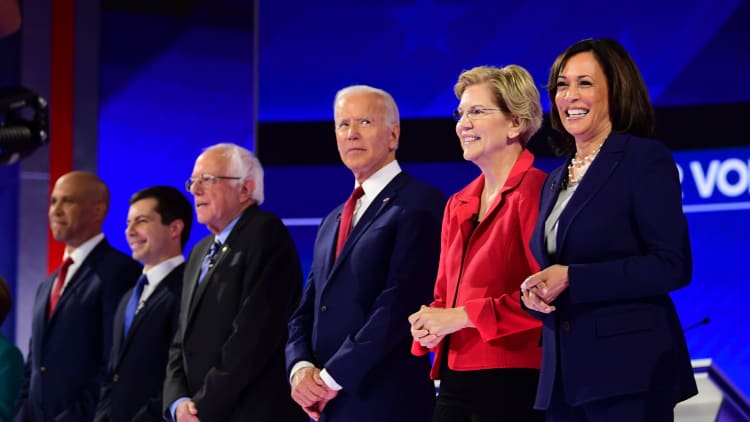Before Sen. Elizabeth Warren took the stage in front of a raucous crowd in New York on Monday, she unveiled a plan that called on lobbyists to be banned from contributing and fundraising to their preferred campaigns.
"My plan not only bans lobbyists from making political contributions, it also bans them from bundling donations or hosting fundraisers for political candidates," Warren said in her Medium post.
This plan represents the latest phase of an apparent shift from Warren, who accepted at least $95,000 from federally registered lobbyists during her campaigns for the U.S. Senate, according to records reviewed by CNBC.
Federal Election Commission filings and lobbying disclosure reports show that Warren accepted the money during the 2012 and 2018 Senate election cycles. The sum from lobbyists represents just a tiny fraction of the money she raised during those Senate campaigns. A $10.4 million transfer from her Senate political committee helped fund the early stages of Warren's presidential campaign.
Since then, Warren has focused on appealing to small dollar donors. She raised $19 million in the second quarter with an average donation of $28 and has refused contributions from lobbyists. Many other primary contenders have followed her lead in not taking money from lobbyists. In the buildup to her run for president, Warren was a vocal critic of lobbyists.
Warren's campaign did not dispute that she's received past campaign contributions from lobbyists and pointed to her success of picking up grassroots support. A representative for the campaign also insinuated that other presidential candidates were attacking Warren for previously accepting lobbyists' donations.
"For nearly two years, Elizabeth's campaign operation has screened and rejected federal lobbyist donations. For over a year, she has rallied candidates and Members of Congress to support her legislation to ban federal lobbyist donations," Warren's deputy press secretary, Saloni Sharma, told CNBC. "Instead of cynically attacking a handful of old donations dwarfed by millions of grassroots contributions in order to deflect from their own practices, every candidate for President should step up, reject federal lobbyist contributions, and support Elizabeth's comprehensive anti-corruption platform, which would end it permanently."
Still, Warren's policy has triggered criticism from lobbyists who supported her in the past.
"I'm not happy with the overall plan. I think the whole thing is silly," Warren donor Robert Crowe, of lobbying firm Nelson Mullins, said Tuesday. He declined to comment further.
In 2011, Crowe sent Warren two separate checks, according to the nonpartisan Center for Responsive Politics. These donations were each for $2,500, the most a donor could give directly to a campaign. Crowe has lobbied for firms such as Google, which is one of the big tech companies that Warren has called to be broken up. He's also represented Ameresco, a publicly traded renewable energy company.
The next year, Warren's campaign accepted a $2,500 check from Gerald Cassidy, the founder of lobbying giant Cassidy & Associates. In 2010, Cassidy and his team agreed to a $25 million contract to lobby for convicted Bangladesh war criminal Mir Quasem Ali. At the time, Ali was being investigated by an International Crimes Tribunal and was sentenced to death in 2014 for crimes against humanity.
When Warren ran for reelection in 2017, she received $1,000 from Henry Menn, a lobbyist who later founded his own firm, Government Counsel LLC. Disclosure reports show his clients include Medtronic, a medical device company, and Lupin Pharmaceuticals, a drug manufacturer whose holding company is based in India.
During that campaign, Warren demanded a lifetime ban on former presidents and lawmakers from becoming lobbyists. "They can put their savings in conflict-free investments like mutual funds or they can pick a different line of work," she said then.
Cassidy & Associates declined to comment, noting their founder retired from the firm. Menn could not be reached.
Warren also took part in fundraisers co-hosted by those with ties to the lobbying industry.
Bob Crowe, a lobbyist who previously worked for Wolf Block Public Strategies, was one of dozens of supporters at a fundraising event last year in Boston. Tickets ranged from $100 to $2,500, according to the invite.
Former Pennsylvania Gov. Ed Rendell hosted an event for Warren in Philadelphia in 2012, when he worked for Ballard Spahr. At that time, he was lobbying for KCI USA, a medical device manufacturing company. The Warren fundraiser charged up to $5,000 for attendees to gain entrance, the flyer shows.
Rendell recently published an op-ed in The Washington Post calling Warren a hypocrite for attacking big money donors after she accepted their help throughout her career in the Senate.
"Warren didn't seem to have any trouble taking our money in 2018, but suddenly we were power brokers and influence peddlers in 2019," Rendell wrote last week. "The year before, we were wonderful. I co-chaired one of the events for the senator and received a glowing, handwritten thank-you letter from her for my hard work."
Rendell supports former Vice President Joe Biden in the race for the 2020 Democratic presidential nomination. Warren and Sen. Bernie Sanders of Vermont are the next-closest candidates to Biden in the polls.



